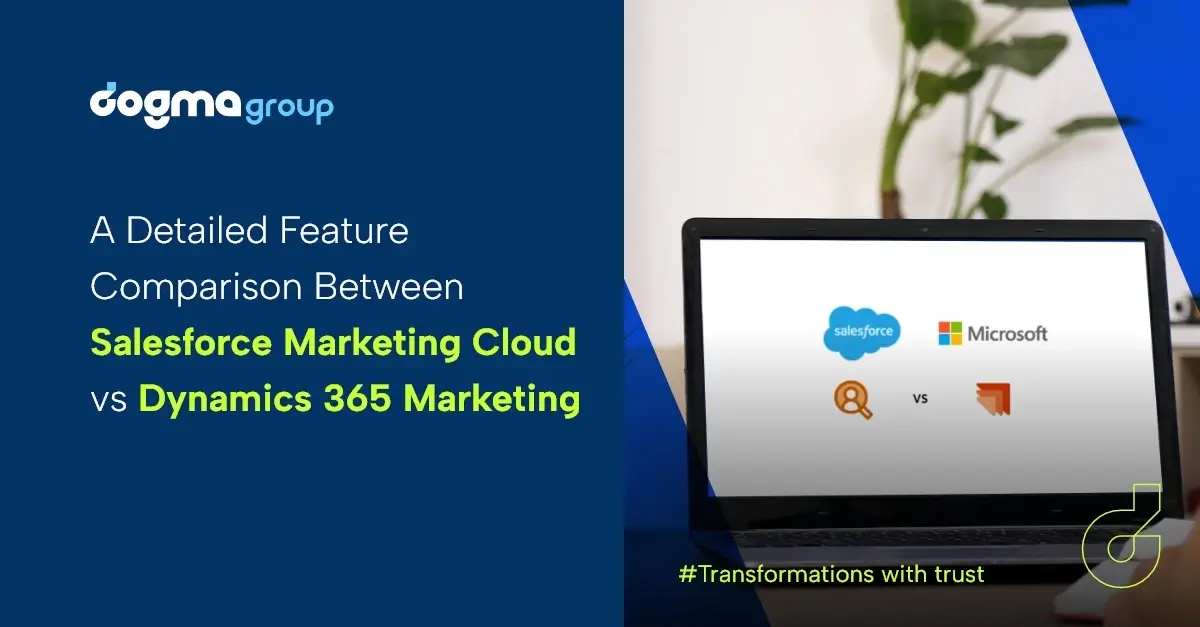Marketing CRM is transforming the entire customer engagement process.
Through enhanced capabilities like email automation, customer segmentation, market analytics and lead scoring, marketing CRM empowers marketers to better comprehend customers’ thought processes and communicate with them more successfully.
Businesses know that already and many are rushing to implement the best Marketing CRM in their organisations. But it’s pretty tricky picking the right Marketing CRM on the fly.
Forget the fact that there are so many Marketing CRMs available today, taking a pick between two of the best industry-leading marketing CRMs, Salesforce Marketing Cloud and Dynamics 365 Marketing can be tough.
Honestly, though it does not have to be. Just follow our detailed features comparison between the two. That will make it so much easier for you to make your choice, we promise.
1. Features
Both Salesforce Marketing Cloud and Dynamics 365 Marketing come with an equal share of features to help you succeed as a client-focused business. While Salesforce Marketing Cloud has various products, including a Customer Data Platform, Personalisation, Engagement, Account Engagement, Intelligence and loyalty Management, Dynamics 365 Marketing offers all the capabilities within the same edition.
Here are some must-have CRM capabilities in both Salesforce Marketing Cloud and Dynamics 365 Marketing.
Journey Builder in Salesforce Marketing Cloud allows you to analyse individual engagement or aggregate customer journey data. By tracking customer behaviour at different touchpoints, you can create personalised fast-track communication plans across SMS, push notifications, ads, web landing pages etc.
Whereas Customer Journey in Dynamics Marketing 365 orchestrates journey based on real-time interactions across channels like emails, web forms and text messaging. This empowers the marketers to communicate with the customers in real-time, addressing their concerns right away.

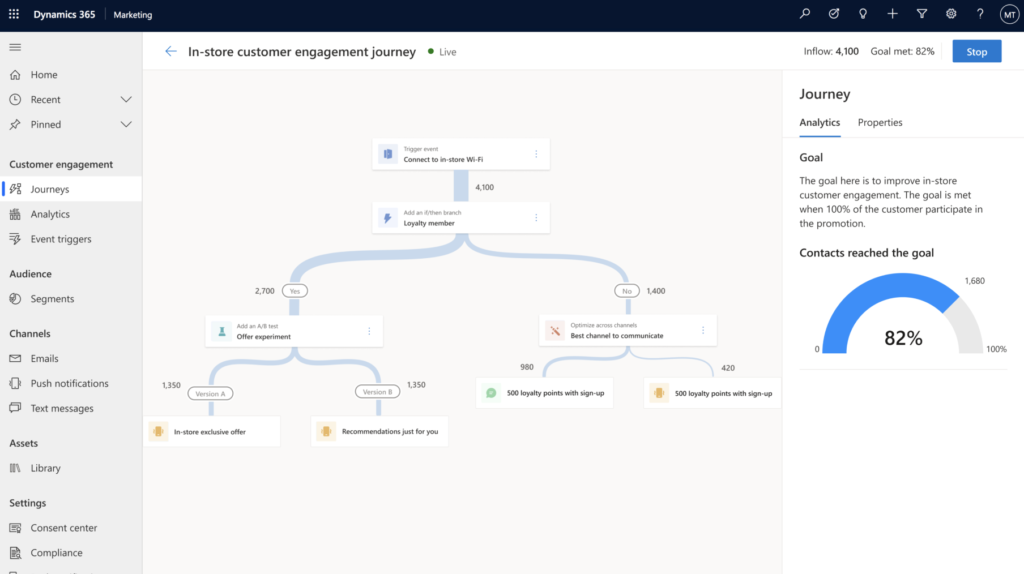
For social media management, you can use Social Studio in Salesforce Marketing Cloud to schedule, create and monitor social media posts in one interface. The feature also monitors real-time data on engagement sentiment to help the marketing team to evaluate content performance.
Similarly, Social Post in Dynamics 365 Marketing allows you to create and schedule social media posts and track engagement metrics once published. This makes your social media journey efficient as you don’t need switch to different interfaces for social media management.
You can use the Lead management feature of Salesforce Marketing Cloud to manage and track campaigns across all channels easily and measure the marketing impact on the sales pipeline across channels. This makes your investment in marketing campaigns simple.
Similarly, Lead Management in Dynamics 365 Marketing allows marketers to generate, manage and qualify leads. Lead scoring is another functionality in lead management from which you can assess how leads can be transformed into opportunities using clear measures.
Features of both the CRMs are updated regularly. Salesforce updates the Marketing Cloud features three times a year as Spring, Summer and Winter releases. Likewise, Microsoft updates Dynamics 365 Marketing features twice a year as Wave I and Wave II release.
2. Accessibility
On-premises vs Cloud
Salesforce is available in the cloud, whereas Dynamics 365 can be deployed in the cloud and on-premises.
Salesforce’s system architecture begins in the cloud and manages all infrastructure and maintenance in the cloud, cutting the overhead of on-premises solutions. Salesforce Marketing offers cloud solutions that are scalable and quickly deployable.
On the other hand, Dynamics 365 Marketing can be implemented on-premises, in the cloud or as a combination.
The combination of cloud and on-premises lessens your operational expenditure and gives you access to cutting-edge technology. A hybrid cloud ensures scalability and meanwhile, gives you the highest control over your data.
Mobile CRM
Both Salesforce Marketing Cloud and Dynamics 365 Marketing Cloud have mobile CRM that delivers a comprehensive experience on smartphones and tablets, empowering your marketing team to manage key information in real-time wherever they are.
3. Artificial Intelligence
Both Salesforce Marketing Cloud and Dynamics 365 Marketing have AI capabilities that can provide key customer insights and boost engagement.
Salesforce’s AI platform, Einstein, is built right in. It delivers predictions and recommendations based on customer data and business processes. Some of the most compelling Salesforce AI capabilities are:
- Einstein Engagement Scoring allows you to better score the split based on the subscriber’s engagement with the email or app. It classifies customers as per their click engagement rates.
- Einstein Engagement Frequency enables the sender to maintain customer engagement by identifying which subscribers already have enough messages and which subscribers have received fewer messages.
- Einstein copy insights help craft subject lines that drive stronger email engagement. The performance tester functionality can determine how your subject line will likely affect a message’s engagement rate by comparing it to past performances.

When talking about Dynamics 365 Marketing, its AI functionality Dynamics 365 Market insights works right out of the box and is customisable.
Some of the interesting AI capabilities of Dynamics 365 Marketing are-
- Dynamics 365 AI for Market Insights helps you know the right audience and their interest in your product with predictive demographic insights, intention analysis and historical insights from Bing keyword searches. This helps you identify the most valuable and potential customers and initiate communication accordingly.

- Automated scheduler analyses the email results in your CRM and learns the days and times when each contact is most likely to be actively reading the email. This enables you to send the right email at the right time.
- Spam checker applies AI to analyse the content of each marketing email message and predict how likely the message is to be flagged by content-based spam filters. This way, you can prevent your content from ending up as spam.
4. Reporting
Both Salesforce Marketing Cloud and Dynamics 365 Marketing offer extensive reporting capabilities with which you can capture ample insights on leads, accounts, segments and customer journeys as its basic reporting functions.
Regarding advanced reporting, Salesforce uses Tableau, a visual analytics platform. On the other hand, Dynamics 365 Marketing uses Power BI, a business intelligence software for Microsoft.
Advanced Reporting in Salesforce Marketing Cloud
Tableau enables powerful visual data exploration with line graphs and bar graphs. You can get reports on various aspects of marketing like campaign activities, blog performance by page views and metrics of digital marketing campaign performance metrics.
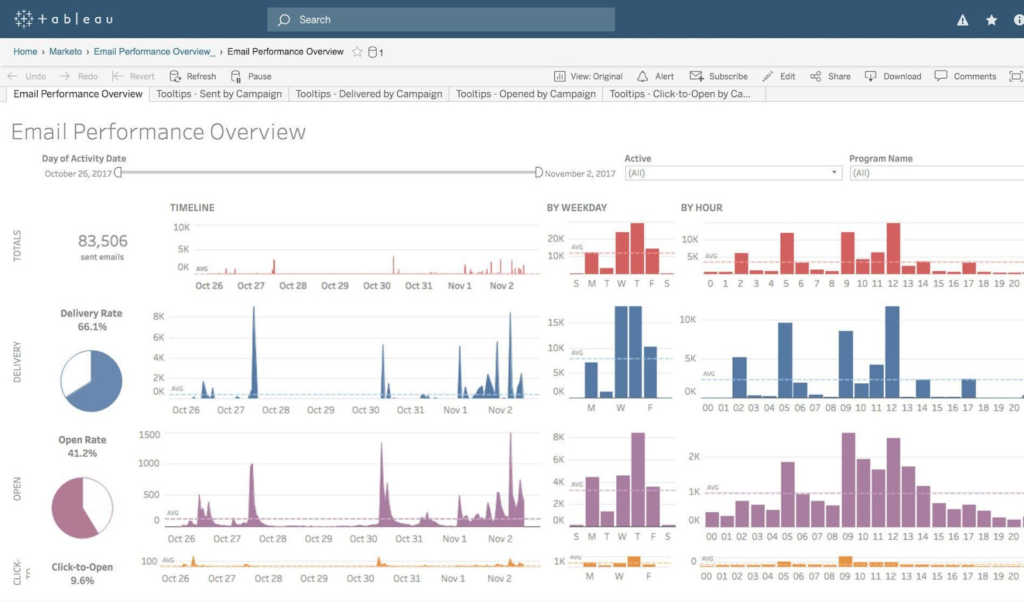
Advanced Reporting in Dynamics 365 Marketing
Using Power BI, you can create a whole range of intelligent data visualisation, right from simple bar charts to pie charts. Social media monitoring and analytics, measuring paid and organic data and keywords analysis are a few capabilities of Power BI integration with Dynamics 365 Marketing.

5. Integrations
Both Salesforce Marketing Cloud and Dynamics 365 Marketing provide a plethora of integration options. Salesforce Marketing Cloud integrates with all Salesforce modules to unify marketing, sales and service efforts and gain a 360-degree view of customers. On the other hand, Dynamics 365 Marketing also integrates with all other modules of Dynamics 365.
Apart from this, if you are utilising Microsoft Suite, Dynamics 365 marketing perfectly fits into your infrastructure and provides excellent collaboration for the marketing team. For example, with the Outlook App, you can generate leads directly from your inbox, making your task less time-consuming. Furthermore, Microsoft also integrates with Power BI, Power Automate, and SharePoint.
Salesforce Marketing Cloud and Dynamics 365 Marketing provide countless custom apps and integrations. These integrations offer flexibility without making your overall system architecture more complicated. You can find a long list of add-ons in the marketplace of both CRM.
Salesforce’s AppExchange, an enterprise Cloud marketplace for Salesforce, has over 3,000 apps that can be integrated with the Marketing Cloud to extend its capability to improve reporting, personalised messaging and many more functionalities.
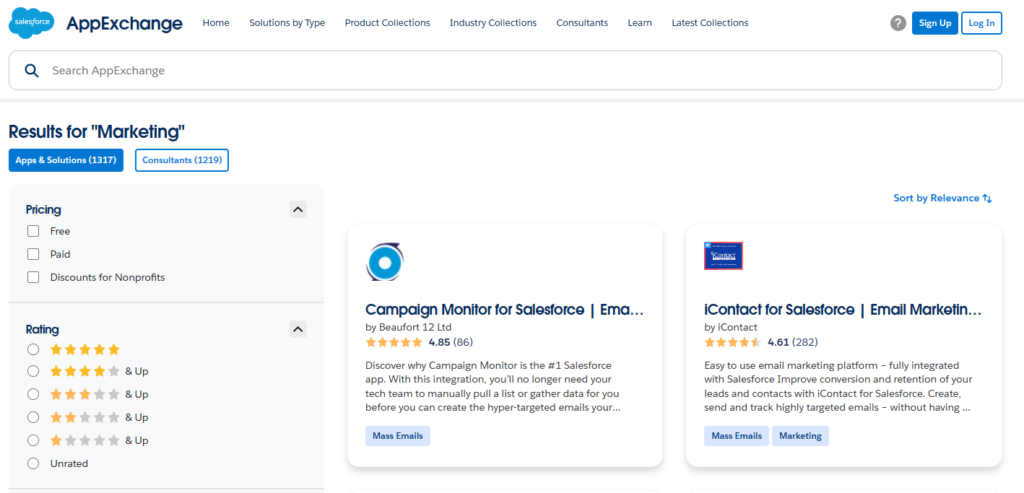
When it comes to Microsoft, you can find several third-party applications in Microsoft App Source, Microsoft’s application marketplace to extend the capabilities of your Dynamics 365 Marketing.
You can do much more with these custom apps, from a 360-degree view of your campaigns to increase efficiency and productivity.

Both the CRM well integrate with LinkedIn. While the Salesforce Marketing cloud needs third-party integration and can be integrated through App Exchange, Microsoft has native integration with LinkedIn.
6. Training & User Experience
While the learning contents for Salesforce Marketing Cloud are interactive and exciting, the learning resources for Microsoft Dynamics 365 Marketing are more informative.
Like other modules, Salesforce Marketing Cloud provides interactive and exciting learning content, which makes the journey interesting right after onboarding.
Salesforce has its own online course in Trailhead in which you can follow guided learning paths, get hands-on, step-by-step instructions and learn directly from Marketing experts in Trailhead.
Marketing cloud basics, data strategy for customer data platforms and mobile strategies are a few interesting and useful courses in Trailhead.
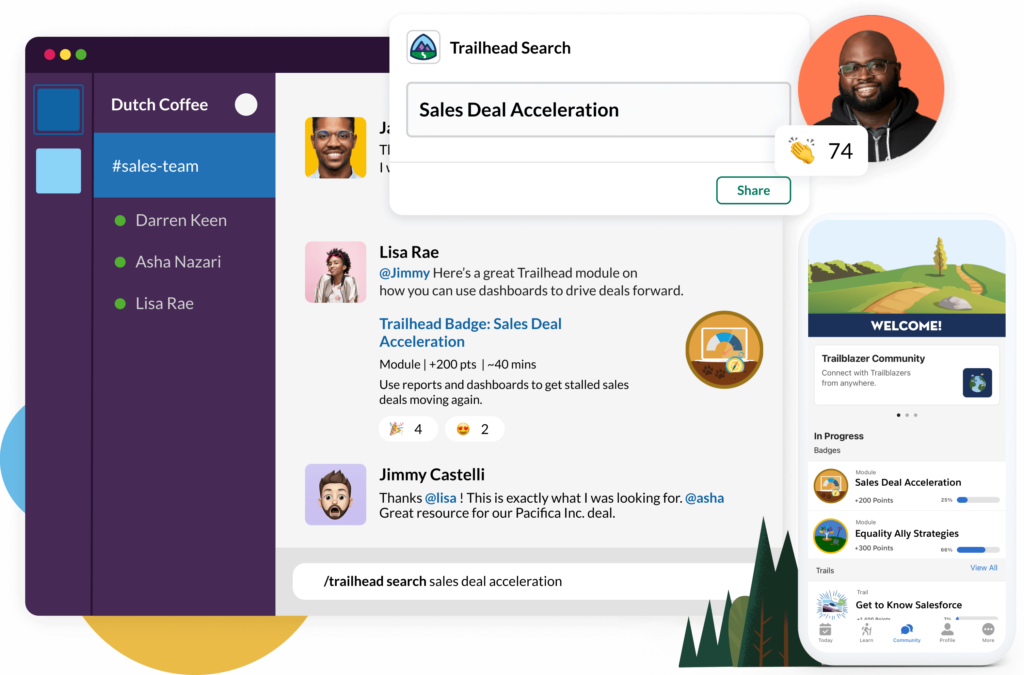
Microsoft, on the other hand, has made learning Dynamics 365 Marketing a much easier experience. You can find the training and learning course in Microsoft Learn.
The learning paths, video sessions and other learning materials are informative and detailed. You can learn various aspects of Dynamics 365 Marketing, like Dynamics 365 Marketing overview, real-time marketing user guide, marketing execution, etc.
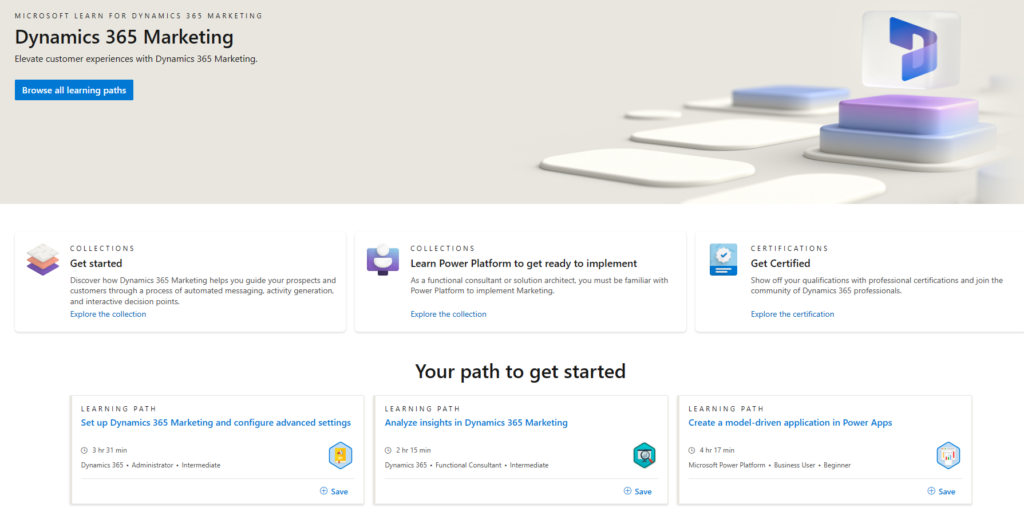
7. Pricing
Salesforce charges on an organisational basis every year. The price range of Salesforce Marketing Cloud starts from £ 1,000 per organisation annually and increases based on the features.
As opposed to that, Dynamics 365 Marketing charges per tenant monthly. The pricing for Dynamics 365 Marketing is £1,131.20 per tenant per month and the price for Dynamics 365 attach is £565.60 per tenant per month.
What’s the Verdict?
While both systems offer functionalities that stand out in the CRM market, Microsoft’s native integration with Office 365 provides enhanced collaboration, communication and productivity from employees.
So, if your business is already functioning heavily in the Microsoft Office realm, Dynamics 365 Marketing can be a good solution for you. On the other hand, Salesforce has strong integration and offers 3,000 plus third-party integrations that make it such a powerhouse in the CRM marketplace.
Both CRM are equipped with strong AI capabilities. Salesforce’s Einstein AI, on the other hand, is believed to be more powerful and uses AI-infused learning algorithms to comprehend the company’s selling behaviours in extensive detail.
While the AI functions of Dynamics 365 are included with CRM, those of Salesforce demand an additional fee.
Tableau is designed specifically for analysts in terms of reporting, but Power BI is better suited to a professional that needs business intelligence to supplement its analytics.
Connecting Excel queries, data models, and reports to Power BI Dashboards is simple for anyone acquainted with Microsoft 365, making it possible to collect, examine, publish, and share Excel business data in new ways. Although Power BI is less expensive than Tableau, the cost will rise when more users and larger features are added.
While talking about the SLA of these two giant players, the SLA for Microsoft Dynamics 365 is 99.9% financially backed and easily obtainable. On the other hand, Salesforce’s SLA are not readily available.
What’s on your mind? Both Salesforce Marketing Cloud and Dynamics 365 Marketing offer similar features for your business. So, how can you evaluate the appropriate CRM for your company?
Since they are each other’s major competitors in the CRM market, the features are largely the same. For that, you need to ensure that your team members are comfortable using the CRM. It is best to do a free trial to decide which CRM can fit your team.
Also, its good to be sure about your specific goals with the CRM. This way you can choose the right CRM that meets your objectives in business.
Apart from these, factors like total cost of ownership, integration, future roadmaps and choosing the right consultation are critical before adopting a CRM.
Both Salesforce and Microsoft Dynamics 365 have significant market shares in the CRM space with hefty investments in R&D and great product roadmaps. So, deciding between the two leading CRMs requires extensive research and consultation from your trusted advisors.
At Dogma, we believe in transformation with trust by providing sustainable digital solutions through fluid transformation. As your trusted advisors, we can help you choose the best-fit technology according to your business needs.
Before we wrap it up, don’t forget to check out this blog which analyses features of both Salesforce Sales Cloud and Dynamics 365 Sales.

